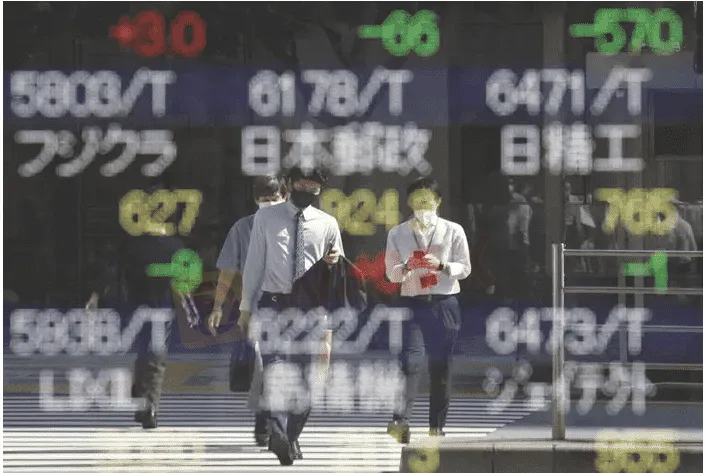简体中文
繁體中文
English
Pусский
日本語
ภาษาไทย
Tiếng Việt
Bahasa Indonesia
Español
हिन्दी
Filippiiniläinen
Français
Deutsch
Português
Türkçe
한국어
العربية
U.S. stocks climb as yields fall to two-week low; copper tumbles
Abstract: Asian shares wobbled while commodity prices fell on Thursday as mounting worries about the risks of a global recession amid aggressive rate hikes by the Federal Reserve kept broad investor sentiment fragile.
Stocks in global markets rose on Thursday as U.S. Treasury yields fell to two-week lows, while copper was at 16-month lows as investors worried about a possible global economic slowdown.

The Nasdaq led the way higher on Wall Street, rising more than 1.6%. Technology shares including Apple Inc and defensive shares gave the S&P 500 its biggest boost as investors continued to worry about a potential recession.
Investors have been weighing the risk of hefty interest rate rises tipping economies into recession.
Federal Reserve Chairman Jerome Powell testified before Congress for a second day, a day after saying the Fed is committed to cutting inflation at all costs, and acknowledged a recession was “certainly a possibility.”
“What we‘re seeing here is a (stock) market trying to absorb the Fed’s tightening and basically trying to put in a low in a bear market,” said Peter Cardillo, chief market economist at Spartan Capital Securities in New York.
“We have yields that are coming down, and so thats helping stocks,” he said. “For now, the market has probably discounted somewhat of a mild recession.”
Gauges of factory activity released on Thursday in Japan, Britain, the euro zone and United States all softened in June, with U.S. producers reporting the first outright drop in new orders in two years.
Manufacturing growth is slowing worldwide partly because China‘s COVID-19 curbs and Russia’s invasion of Ukraine have disrupted supply chains and added to inflation problems.
The Dow Jones Industrial Average rose 194.23 points, or 0.64%, to 30,677.36, the S&P 500 gained 35.84 points, or 0.95%, to 3,795.73 and the Nasdaq Composite added 179.11 points, or 1.62%, to 11,232.19.
The pan-European STOXX 600 index lost 0.82% and MSCIs gauge of stocks across the globe gained 0.43%.
In the U.S. bond market, yields fell, partly on a growing belief that yields may have topped for the near term even if inflation stays high.
Yields have dropped from their highest level in more than a decade, reached before last weeks Fed meeting, when the U.S. central bank hiked rates by 75 basis points, the biggest increase since 1994.
Benchmark U.S. 10-year yields fell to 3.005%, before rebounding to 3.070%. They have dropped from 3.498% on June 14, the highest since April 2011.
Copper prices slumped as rising interest rates and weak economic data fed worries about demand.
Copper on the London Metal Exchange (LME) hit its lowest level since February 2021.
In the foreign exchange market, the euro slid across the board following the weaker-than-expected German and French PMI data.
Against the dollar, the euro declined 0.5% to $1.0509. It earlier declined below a key $1.05 level for the third time this week. The euro also declined 1.4% versus the Japanese currency to 141.85 yen.
Oil prices ended lower as investors weighed the risk of a recession. Brent crude futures fell $1.69 to settle at $110.05 a barrel, while U.S. West Texas Intermediate (WTI) crude futures dropped $1.92 to settle at $104.27.

Disclaimer:
The views in this article only represent the author's personal views, and do not constitute investment advice on this platform. This platform does not guarantee the accuracy, completeness and timeliness of the information in the article, and will not be liable for any loss caused by the use of or reliance on the information in the article.
Read more

Top 10 Trading Indicators Every Forex Trader Should Know
Master the top 10 Forex trading indicators to analyze real-time Forex quotes, trends, and market signals. Learn strategies to boost accuracy and avoid mistakes.

Geopolitical Events: What They Are & Their Impact?
You've heard many times that geopolitical events have a significant impact on the Forex market. But do you know what geopolitical events are and how they affect the FX market? Let us learn about it today.

Why Do You Feel Scared During Trade Execution?
Trade execution is a pivotal moment for traders. It is when analysis turns into action, and potential profits or losses become reality. However, for many traders, this moment is accompanied by fear. Why does this happen, and how can you address it?

WikiEXPO Global Expert Interview: Simone Martin—— Exploring Financial Regulation Change
In the midst of financial innovation and regulation, WikiGlobal, the organizer of WikiEXPO, stays abreast of industry trends and conducts a series of insightful and distinctive interviews on pivotal topics. We are delighted to have the privilege of inviting Simone Martin for an in-depth conversation this time.
WikiFX Broker
Latest News
Geopolitical Events: What They Are & Their Impact?
Volkswagen agrees deal to avoid Germany plant closures
Top 10 Trading Indicators Every Forex Trader Should Know
WikiEXPO Global Expert Interview: Simone Martin—— Exploring Financial Regulation Change
TradingView Launches Liquidity Analysis Tool DEX Screener
MultiBank Group Wins Big at Traders Fair Hong Kong 2024
'Young investors make investment decisions impulsively to keep up with current trends' FCA Reveals
Why Do You Feel Scared During Trade Execution?
CySEC Settles Compliance Case with Fxview Operator Charlgate Ltd
Malaysian Influencer Detained in Taiwan Over Alleged Role in Fraud Scheme
Currency Calculator


